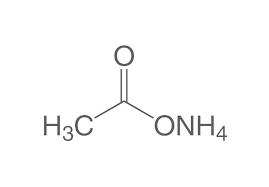Ammonium Acetate

Product Description
Ammonium acetate is the ammonium salt of acetic acid, commonly used in various industrial and laboratory applications.
Product:
Ammonium Acetate
CAS:
631-61-8
Synonym:
Acetic acid; Ammonium salt Azanium Acetate; Acetic acid ammonium salt
Structure:

Typical Characteristics
Appearance
White hygroscopic crystals or powder
Boiling point
Decomposes at approximately 300 °C
Density
1.17 g/cm3
Flash Point
136 °C
Melting point
113 °C
Molecular Weight
77.08
Odor
Slightly acetic acid-like
Purity
≥99.0%
Refractive index
1.4350
Uses, Applications & Markets
Key applications
get a quote
We Offer Ammonium Acetate
in various grades
A few of the grades available are listed below:



Ammonium Acetate used in many
industry applications
Ammonium acetate is the ammonium salt of acetic acid, commonly used in various industrial and laboratory applications. Here are some of its uses:
- Chemical Synthesis: Ammonium acetate serves as a reagent or catalyst in organic synthesis reactions, particularly in the production of pharmaceuticals, dyes, and specialty chemicals.
- Buffer Solution: It is used in biochemical and molecular biology laboratories as a component of buffer solutions, helping to maintain a stable pH environment in various experimental procedures.
- Desiccant: Ammonium acetate is utilized as a desiccant in analytical chemistry techniques such as mass spectrometry, where it helps remove moisture from samples and solvents without interfering with the analysis.
- Food Additive: It is sometimes used as a food additive, particularly in the production of certain bakery products and confectionery items, where it functions as an acidity regulator and flavor enhancer.
- Textile Industry: Ammonium acetate finds application in the textile industry as a mordant in dyeing processes, helping to fix dyes to fibers and improve colorfastness.
- Photography: In photographic film development, ammonium acetate is used as a buffer and pH regulator in developer solutions, aiding in the development of images.
- Medicine: It may be used in some medical applications, such as in certain topical formulations or as a component in laboratory reagents for diagnostic tests.
- Animal Feed: Ammonium acetate can be included in animal feed formulations as a source of nitrogen and a pH regulator to support animal nutrition and health.
- Chemical Analysis: It is utilized in analytical chemistry techniques for various purposes, including precipitation reactions, titrations, and as a component in mobile phases for chromatography.
- Paints and Coatings: Ammonium acetate may be used in the formulation of paints, coatings, and varnishes as a pH regulator or as an ingredient in certain formulations.